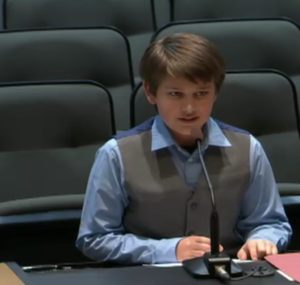
Florida lawmakers are once again pushing a proposal to expand computer science instruction and allow students to count high school credits in coding as foreign language classes.
A compromise bill that easily passed the Senate last year is back. It easily cleared its first legislative committee Monday. An identical version has been filed in the House.
The debate that still lingers around the proposal highlights the difficulty of giving students access to high-quality computer science courses.
Business and technology groups support SB 104 by Sen. Jeff Brandes, R-St. Petersburg. They’re joined by students like Ethan Greenberg, a sixth-grader from Pembroke Pines. He told the Senate Education Committee he became interested in computer science as he struggled with dysgraphia, which made it difficult for him to recognize letters and numbers. He overcame that obstacle by typing on a computer, and has since started learning to code.
His mother, Ryan Greenberg, joined him testifying in favor of the bill.
“When kids have a choice, they come to the classroom excited to learn and more than likely, will get a good grade in the class they choose,” she said. “This will be an important step forward in our state’s need to integrate technology into our education curriculum.”
Objections to the proposal come largely from foreign language educators like Linda Markley of the Florida Foreign Language Association. She said she worries that, if the bill passed, schools would feel pressure to “cut language program offerings in order to make room for computer coding classes.”
“When a new course comes along, and they don’t know where to put in the scheduling, or they don’t know where to get the funding for a teaching unit, they take away world languages and cut their programs,” she said.
Lawmakers fashioned a compromise during the last legislative session but it ultimately didn’t pass. It’s designed to address Markley’s concerns by making it optional for school districts to expand computer science instruction. The revised bill would encourage Florida Virtual School to offer computer science courses to help close gaps in school district offerings. That approach that seems to be finding early success in places like Monroe County.
Last year, Florida became the first state in the nation to adopt academic standards for K-12 computer science instruction. But some STEM education advocates, like Florida State University physics professor Paul Cottle, argue the biggest barrier to computer science instruction is a shortage of qualified teachers.
Can online computer science classes can help solve this problem? Cottle, for his part, has argued the state needs to focus on recruiting qualified computer science instructors, who may command higher salaries than their counterparts in other fields. Virtual education can help a limited pool of teachers reach more kids, but Markley is clearly among the skeptics. She said she’s heard students complain about the quality of instruction in online computer science courses.
Perhaps virtual schools can improve students’ experience by adding new layers of in-person support. The demand for computer science courses is growing, but the shortage of offerings is real. It’ll be worth looking for new ways to close that gap.


